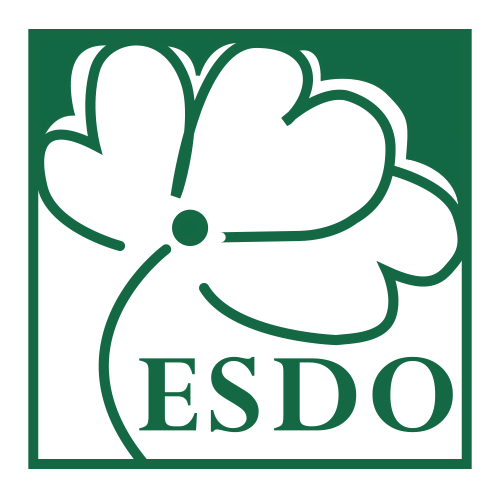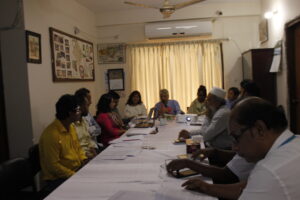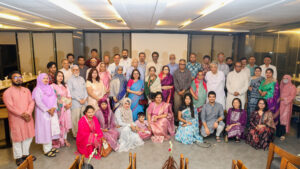14 November, 2018, Dhaka: Around 250 tons of single use plastics particularly straws and cutleries are discarded every month. The findings revealed from a study.To release the findings of the study entitled “Stop using single use plastic (SUP) to protect human health and Environment”, Environment and Social Development Organization-ESDO called on a press briefing on Wednesday at ESDO’s head office, Dhaka.
From the initial survey, it was estimated that only from old town in Dhaka, around 250 tons of single use straws and plastics cutleries are being sold per month. It is estimated from ESDO study that with other sources the total generation of single use plastics is 312 tons per month in all over Bangladesh. The amount was calculated through a questionnaire survey which was done both for whole sale manufacturer and retailers. Only from 5 straw and cutleries manufacturer, around 9 crore 75 lac pieces of single use plastics are being sold in each month in the form of straws and cutleries which weigh equivalent to 195 tons per month in old town Dhaka. From the 25 retailers, around 50 tons of single use plastics are produced in the same way in Chokbazar area. In total 250 tons of single use plastics are produced all over Bangladesh. Among this, approximately 80 to 85% are discarded waste which end point is in the drain, river or ocean and this are creating massive pollution in the nearby rivers and at the end in the Bay of Bengal.
Single-use plastics or disposable plastics are used only once before they are thrown away. Single use plastic includes drinking straws, Plastic cotton buds, Sachets, food packaging, coffee stirrers, water bottles and plastic bags etc. The main problem with these single use plastics is they are non-recyclable and non-biodegradable. They slowly break down into smaller fragments known as micro-plastics. In the process of breaking down, it releases toxic chemicals which enter into our food chain and water supply. These toxic chemicals are now being found in our bloodstream. And the latest research has linked them to cancer, infertility, birth defects, impaired immunity and many other ailments.
ESDO Chairperson and former Secretary Syed Marghub Murshed, Prof. Md. Abul Hashem, Chairman of chemical division (BSTI), Secretary General of ESDO Dr. Shahriar Hossain, Siddika Sultana, Executive Director of ESDO , other team members of ESDO along with various journalist from electronic and print media were present on this press briefing.
Syed Marghub Murshed said, “In Bangladesh, manufacturers are using single use plastic for packaging various food products, household and personal care products. Also straws and plastic cutleries are widely used as single use plastic. This single use plastic contains many different chemicals with endocrine disrupting properties including solvents, UV stabilizers, phthalates, antimicrobials, and industrial additives. The diverse array of chemicals used in plastic packaging, combined with their widespread use, greatly increases exposure to endocrine disrupting chemicals (EDCs) all over the planet which is a great threat for the environment.”
Professor Md. Abul Hashem, Chairman, Chemical Division, BSTI said, “Awareness should be raised against the use of single use plastic. Single use plastics are a big environmental problem and are causing huge issues that affect human and animal health.”
Secretary General of ESDO, Dr. Shahriar Hossain Said, “Single use plastic contains various polymers like in food packaging film they contains Low Density Polyethylene (LDPE), Cutlery, plates and cups contains polystyrene (PS), Hot drink cups, insulated food packaging contains Expanded polystyrene (EPS), Microwave dishes, ice cream tubs, potato chip bags, bottle caps contains Polycarbonate polypropylene (PP). Foamed plastic contains styrene and Benzene which are toxic and carcinogenic. They have severe effects on our respiratory, nervous system and also in reproductive systems. To stop this pollution, we can think about alternatives. Environmentally more friendly alternatives of plastic straws as for example Bamboo straws, Glass straws, Metal straws, Stainless Steel Straws and Paper straws could be a better options in this situation.”
There are so many countries all over the world have taken initiatives to Ban or reduce the consumption of Single-Use Plastics. Costa Rica now aims to become the first country in the world to ban all kinds of single-use plastics by 2021. In Vancouver of Canada, Great Britain, Sikinos island of Greece, New Delhi of India, Guatemala, Glasgow of Scotland, Taiwan, European Union, Switzerland and some states of America took strong initiatives for banning plastic straws immediately. Bangladesh also should come forward to stop the use of this Single use plastic for saving the nature and environment.


